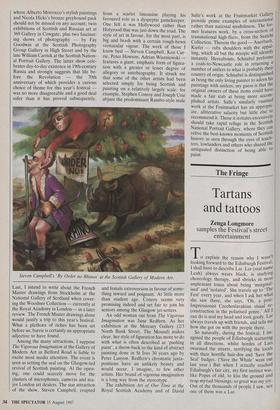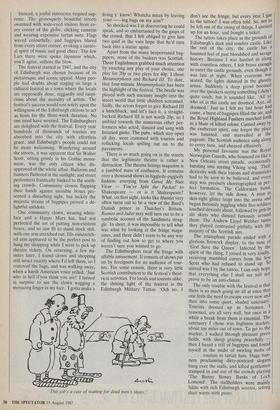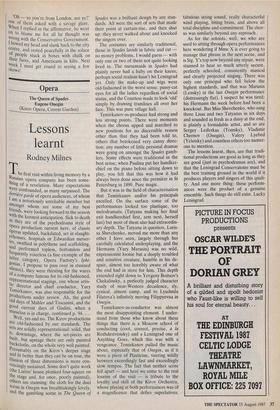The Fringe
Tartans and tattoos
Zenga Longmore samples the Festival's street entertainment
To explain the reason why I wasn't looking forward to the Edinburgh Festival, I shall have to describe Lar. Lar (real name Leah) always wears black, is studying choreology therapy, and shrieks in most unpleasant tones about being 'marginal" ised' and 'isolated'. She travels up to 'The Fest' every year, and when I ask her what she saw there, she says, 'Oh, a post- Impressionist Czechoslavakian visual re- construction in the polarised genre.' All I can do is nod my head and look goofy. Lar always travels up with friends, and tells me how she got on with the people there.
So naturally, during the festival, I im- agined the people of Edinburgh scattering in all directions, whilst hordes of Lars swarmed the streets, terrifying the locals with their horrific hair-dos and 'Save the Seal' badges. ('Save the Whale' went out last year.) But when I actually reached Edinburgh's fair city, my first instinct was, like Popes of old, to kiss the ground and reap myriad blessings; so great was my joy. Out of the thousands of people I saw, not one of them was a Lar.
Instead, a joyful innocence reigned sup- reme. The grotesquely beautiful streets swarmed with wide-eyed visitors from ev- ery corner of the globe, clicking cameras and wearing expensive tartan suits. Flags waved colourfully, and bagpipes blared from every street corner, evoking a carniv- al spirit of music and good cheer. The few Lars there were spoke Japanese which, you'll agree, softens the blow.
The festival started in 1947, and the city of Edinburgh was chosen because of its picturesque and scenic appeal. Many peo- ple had doubts about staging so large a cultural festival in a town where the locals are supposedly dour, niggardly and suspi- cious about the morality of artists. The festival's success would rest solely upon the willingness of the Edinburgh citizens to act as hosts for the three-week duration. No one need have worried. The Edinburghers are delighted with the festival. Every year hundreds of thousands of tourists are absorbed into the city with effortless grace, and Edinburgh's people could not be more welcoming. Wandering around the streets, it was apparent that Sir Walter Scott, sitting grimly in his Gothic monu- ment, was the only citizen who dis- approved of the whole affair. Balloons and banners fluttered in the sunlight, and street performers frantically busked to the seeth- ing crowds. Community clowns flapping their hands against invisible boxes pre- sented a disturbing sight, but luckily the majestic strains of bagpipes proved a de- lightful antidote.
One community clown, wearing white- face and a Harpo Marx hat, had not perfected the art of patting non-existent boxes, and so saw fit to stand stock still, with one arm stretched out. His outstretch- ed arm appeared to be the perfect post to hang my shopping while I went to pick up theatre tickets. On returning, a few mi- nutes later, I found clown and shopping still intact exactly where I'd left them, so I removed the bags, and was walking away, when a harsh American voice yelled, 'Just who in hell d'you think you are!' I turned in surprise to see the clown wagging a menacing finger in my face. 'I gotta make a living y' know! Whatcha mean by leaving your —ing bags on my arm?'
So shocked was I at discovering he could speak, and so embarrassed by the gasps of the crowd, that I felt obliged to give him two quid in the vain hope that he'd turn back into a statue again.
Apart from the many besporraned bag- pipers, none of the buskers was Scottish. Three Englishmen grabbed much attention by enacting any play of your choice, one play for 20p or two plays for 40p. I chose Metamorphosis and Richard III. To date, that four-minute Metamorphosis has been the highlight of the festival. The beetle was played with such uncanny insight into the insect world that little children screamed. Sadly, the actors forgot to give Richard III a hunchback, and let's face it, a straight- backed Richard III is not worth 20p, so I ambled towards the numerous other per- formers who acted, danced and sang with frenzied gusto. The pubs, which stay open all day, were crammed with tourists and rollicking locals spilling out on to the pavements.
There is so much going on in the streets that the legitimate theatre is rather a distraction. The theatre listings magazine is a jumbled mass of confusion. It contains over a thousand shows in higgledy-piggledy fashion: everying from Gawd Me Nuts Vicar — You've Split the Packet! to Shakespeare — or is it Shakespeare? What, on first sight, looks like Hamlet very often turns out to be a view of. the Bard's Danish prince in Thatcher's Britain. Romeo and Juliet may well turn out to be a symbolic account of the Sandinista strug- gle. In short, it was impossible to tell what was what by looking at the fringe maga- zines, and there didn't seem to be any way of finding out how to get to where you weren't sure you wanted to go.
The Edinburghers treat the fringe with affable amusement. It consists of shows put on by foreigners for an audience of tour- ists. For some reason, there is very little Scottish contribution to the festival's theat- rical activities. For locals and tourists alike, the shining light of the festival is the Edinburgh Military Tattoo. `Och no, I This job's a case of waiting for dead men's shoes.' don't see the fringe, but every year I gae to the tattoo!' I was often told. So, not to be left out of the swing of things, I queued up for an hour, and bought a ticket.
The tattoo takes place in the grounds of Edinburgh's dark and sombre castle. Like the rest of the city, the castle has a haunted feel of past bloodshed and savage history. Because I was hustled in along with countless others, I felt brave enough to enter the castle grounds, even though it was late at night: When everyone was seated, the lights dinimed in the ghostly arena. Suddenly a deep growl boomed over the speakers saying something I didn't quite catch, but it sounded like, 'All Ye who sit in this castle are doomed. Aye, all doomed.' Just as I felt my last hour had come, a burst of bagpipes filled the air, and the Royal Highland Fusiliers marched forth in a blaze of kilted colour. Carried away by the exuberant spirit, one forgot the place was haunted, and marvelled at the pageant. The Scottish audience sang along to every tune, and cheered effusively. My personal favourite was the Royal Norwegian Guards, who bounced on like a New Orleans street parade, occasionally bursting into stirring Viking song. Their dexterity with their batons and drumsticks had to be seen to be believed, and every step was precisely choreographed in Per' fect formation. The Californian band, however, let the side down. A man in skin-tight glitter leapt into the arena and began furiously juggling while five soldiers louched slovenly about, followed by girls in slit skirts who danced furiously around them. The Andrew Lloyd Webber tunes they played contrasted pitifully with the majesty of the Scottish airs.
The triumphant parade ended with a glorious firework display, to the tune of `God Save the Queen'. Infected by the spirit of the thing, I joined in very loudly, receiving mumbled curses from the few Scots who had refused to stand up. So stirred was I by the tattoo, I can only hope that everything else I shall see will not prove to be an anti-climax. The only trouble with the festival is that there is so much going on all at once that one feels the need to escape every now and then into some quiet, shaded sanctuary- Tourists dressed up as Scotsmen, I reasoned, are all very well, but once in a while a break from them is essential. The sanctuary I chose was Ingliston market. about ten miles out of town. To get to the market, I walked through pleasant green fields, with sheep grazing peacefully — then I heard a trill of bagpipes and found myself in the midst of swirling mobs of tourists in tartan hats. Huge ban- ners proclaiming dirty-postcard slogans hung over the stalls, and kilted gentlemen stamped in and out of the crowds playing `The Bonny Bonny Banks of Loch Lomond'. The stallholders were mainly Sikhs with rich Edinburgh accents, selling their wares with gusto.
`Oh — so you're from London, are ye?' one of them asked with a savage glare. When I replied in the affirmative, he went on to blame me for all he thought was wrong with the Conservative Government. I bowed my head and slunk back to the city centre, and rested peacefully in the solace of people stuck in boxes with chalk on their faces, and Americans in kilts. Next week I must get round to seeing a few shows!




















































 Previous page
Previous page